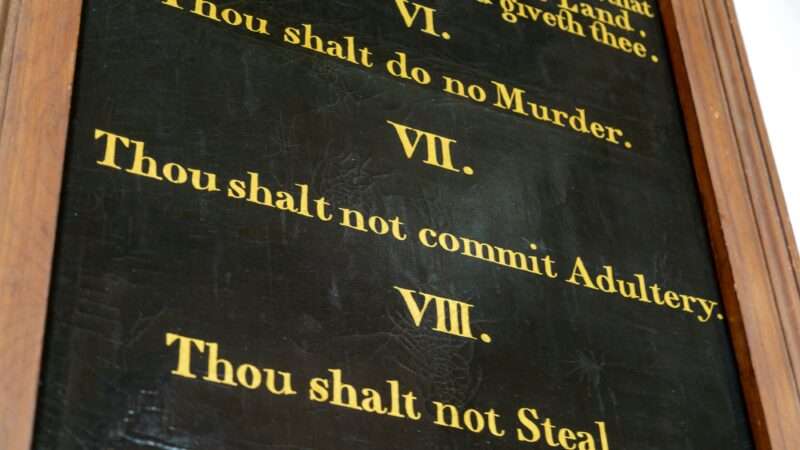
No: Louisiana Republican Gov. Jeff Landry signed a bill, H.B. 71, on Wednesday requiring all public schools in the state to display a poster of the Ten Commandments in each classroom. The Commandments must be, per the text of the bill, in "large, easily readable font," and they will be displayed at every level of schooling, including at public universities.
"If you want to respect the rule of law," Landry said recently, per National Review, "you've got to start from the original law giver, which was Moses." Landry also said that he "can't wait to be sued" over this.
Landry may be trying to garner a reputation as a culture war provocateur, but the governor could easily look around and figure out how the courts are likely to rule on this, since it's already been tried before.
In 1980, the Supreme Court overturned a similar statute in Stone v. Graham, ruling that the First Amendment bars displays of the Ten Commandments in public school classrooms. Such displays, the Court wrote, "had no secular legislative purpose" and were "plainly religious in nature."
"The Commandments do not confine themselves to arguably secular matters, such as honoring one's parents, killing or murder, adultery, stealing, false witness, and covetousness," wrote the majority in that decision. "Rather, the first part of the Commandments concerns the religious duties of believers: worshipping the Lord God alone, avoiding idolatry, not using the Lord's name in vain, and observing the Sabbath Day."
"This is not a case in which the Ten Commandments are integrated into the school curriculum, where the Bible may constitutionally be used in an appropriate study of history, civilization, ethics, comparative religion, or the like," wrote the Court. "If the posted copies of the Ten Commandments are to have any effect at all, it will be to induce the schoolchildren to read, meditate upon, perhaps to venerate and obey, the Commandments. However desirable this might be as a matter of private devotion, it is not a permissible state objective under the Establishment Clause."
"Politicians have no business imposing their preferred religious doctrine on students and families in public schools," reads a statement issued jointly by groups, including the American Civil Liberties Union, its Louisiana chapter, Americans United for Separation of Church and State, and the Freedom from Religion Foundation, that are suing over this law.
Biden's lady issue: President Joe Biden's "current standing among women is the weakest lead a Democrat has had since 2004, a key factor in how tight the race is," reports The New York Times, per recent polling data.
Four years ago, when running for president, Biden's lead with women hovered at 13 percentage points. Now, it's more like eight percentage points, per polls conducted over the last six months. His lead with black and Hispanic women has dropped considerably since 2020.
Biden "is winning among Black women in the KFF survey by 58 percentage points, but that represents a significant drop from his 86 percentage point margin among Black women in the approach to the 2020 election, according to an average of New York Times/Siena College polls from that election," per the Times. Given how galvanized female voters tend to be by the abortion issue, there's some possibility he'll recover support over the next few months depending on what happens nationally with that issue.
Interestingly, pollsters with KFF—which focuses on polling related to health policy issues—found that in states such as Arizona, with more restrictive abortion policies that may be voted on sooner, "Democratic women were more motivated to vote than in states where abortion access was not at risk" (per the Times); KFF found that Biden is performing worse with women in Michigan than in Arizona, possibly because Michigan already voted on an amendment which secured a constitutional right to abortion access two years ago, making it a less salient current-day issue.
"Many Michigan women see abortion as a settled issue in their state," reports KFF.
Scenes from New York: "New York City's Rent Guidelines Board (RGB) voted to cut rents at rent-stabilized apartments yet again, although you might not know that from the press coverage," writes Reason's Christian Britschgi. "Earlier this week, the RGB—a city regulator responsible for setting maximum legal rent increases on the city's roughly one million rent-stabilized units—voted to allow rent increases of 2.75 percent for one-year leases and 5.25 percent for two-year leases. Nominally, that is a rent increase. When compared against the year's 3.3 percent inflation, as measured by the Consumer Price Index (CPI), that's a real decrease in rents."
QUICK HITS
- The story of how Lambda School, an educational startup championing income share agreements and providing a promising alternative to college, failed.
- Climate activist ruffians from a group called Just Stop Oil defaced Stonehenge with orange powder paint. But the monument has a rare type of lichen living on it, so the radicals may have ironically destroyed a little bit of biodiversity in the process.
- Is the Baltic region becoming "a second front in the West's conflict with Moscow"? "In the past few months alone, Finland and Sweden have suffered airspace violations, multiple commercial aircraft have been prevented from landing at small airports due to interference with the global positioning system, and Poland has detained people for alleged Russia-backed acts of sabotage inside the European Union," reports Bloomberg.
The post Thou Shalt Not Covet State Power appeared first on Reason.com.







